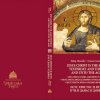The concert at the Strathmore Music Center in Washington D.C was the third performance on the U.S. tour and, once again, the audience was completely enchanted. They first stood up for the American and Serbian national anthems at the beginning of the concert, but as the orchestra’s last tones reverberated in the hall they were on their feet again, calling for encore.
The Belgrade Philharmonic’s orchestra not only connected the Serbian and American audiences, but it also gathered members of the U.S. diplomatic corps. Beside the US Ambassador to Serbia Michael Kirby, the concert was also attended by his predecessor Mary Warlick.
“I feel so much joy to be in the Strathmore Center tonight for this exceptional concert of the Belgrade Philharmonic Orchestra. It has been a while since the last time I had the chance to hear them and I remember with affection all those delightful nights I spent at Kolarac. It is a great pleasure to welcome the Belgrade Philharmonic in America and an excellent opportunity for your orchestra to share its talent with the American people. Thank you so much for coming”, said Mary Warlick.
Ambassador Michael Kirby has followed the Belgrade Philharmonic in all concerts of the American tour so far. “Washington is a unique experience. After Chicago and Cleveland, two cities with longer music traditions, only the first-class orchestras come to play in the Strathmore Center. A large audience showed up and the concert was excellent. Each of the concerts was different due to diverse acoustics of the halls. Among the audience, there were many Americans. I think it was wonderful that The Legend of Ohrid was included in the programme and that a piece written by a Serbian composer was presented.”
In addition to the U.S Ambassador to Serbia, guests at the concert also included members of the diplomatic corps and the US Department of State officials.
Following the concert in the prestigious Strathmore Center, the Belgrade Philharmonic will conclude its U.S. tour on 9 October, with a concert in Carnegie Hall, New York.
Source: Belgrade Philharmonic Orchestra




